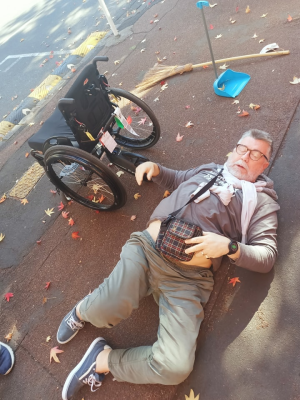Paraplegic man left stranded after airline damages his wheelchair—again
By
Maan
- Replies 0
Travelling by air should be an exciting experience—but for some passengers, it can quickly turn into a nightmare.
One Australian man's repeated encounters with airline mishandling have left him with more than just damaged belongings.
What happened to him highlights a deeper issue affecting thousands of travellers with mobility needs.
Travelling often brought Stuart Hurst immense joy—until it also brought devastation.
The Sydney man, who is a paraplegic, had long gone the extra mile to safeguard his essential mobility equipment whenever he boarded a flight.
He even created a laminated sign to attach to the back of his $35,000 wheelchair, listing its dimensions, his contact details, and a heartfelt message to baggage handlers: ‘Remember, this chair is my legs.’
But in December 2023, that plea was seemingly ignored.
Hurst had just returned to Sydney from a trip to Melbourne aboard a Virgin Australia flight when he discovered that three spokes on one of his wheelchair’s wheels had been bent and the rim had a hole in it.
‘You’ve got no idea of the stress levels,’ he said, reflecting on the chaos of trying to get back to his Rockdale home with a damaged chair.
Sadly, this was far from an isolated incident.
Only a month earlier, during a trip from Auckland, Air New Zealand had accidentally left his wheelchair behind. And in another December 2023 flight—this time with Latam Airlines—his chair was damaged so badly the repairer suspected it had been dropped from the cargo hold onto the tarmac.
‘The axle was bent, the wheel was bent, and I was hotel-bound for the whole time I was in Auckland,’ Hurst recalled.
‘It meant I couldn’t go and meet my grandson, who had just been born and was in hospital.’
Over the past three years alone, Hurst said airlines had either lost or damaged his wheelchair five times.
The recurring trauma pushed him to take action. He launched a Change.org petition calling on airlines to treat wheelchairs ‘with the respect and care they deserve’.
‘It’s not sympathy we’re after, it’s just empathy. I just want them to treat our chairs with the understanding that they are our lifelines—it’s how I get around,’ he said.
Despite how vital wheelchairs are, Hurst said airlines had shown little consistency when things went wrong.
Virgin Australia covered the cost of repairs and gave him a travel voucher. Latam Airlines paid for the damage but offered nothing further. In contrast, Air New Zealand ‘bent over backwards’—not only did they deliver his wheelchair to his door the next day, they also arranged a taxi to ensure he got home safely.
Still, Hurst said that no matter how good an airline’s response was after the fact, it didn’t erase the initial damage or the emotional toll it caused.
‘Having a wheelchair damaged or lost was a devastating and all too common experience for plane passengers with a disability,’ he said.
Figures from the US Department of Transportation reveal a troubling pattern—more than 11,000 wheelchairs or mobility scooters were lost or damaged by airlines in 2023. While no equivalent statistics exist for Australia, Hurst’s experience paints a worrying picture.
His passion for travel remained unshaken, even after the 2018 accident in Nepal that left him paralysed.
While abroad, Hurst had been involved in a near-fatal crash. He was airlifted to Bangkok, where he underwent multiple brain surgeries and remained hospitalised for a month before returning to Sydney.
‘I was brain dead,’ he said.
‘My brothers were called into Royal North Shore Hospital and I was on the bed with tubes hanging out everywhere. Doctors said that it was as good as I’d get, and I’d need 24-hour-a-day, seven-day-a-week care.’
‘Don’t ask me how, or why, but I got through it. I was in hospital for 23 months. I’ve just been so lucky.’
That determination led him to start a website called *The Travelling Para*, where he now shares his experiences and advocates for better treatment of disabled travellers.
Source: Instagram/stuarthurst17
In response to his petition, Air New Zealand’s general manager customer, Alisha Armstrong, acknowledged the issue and offered support.
‘At Air New Zealand, we understand how essential wheelchairs and other types of mobility equipment are to our customers, and we take our responsibility to handle them with care extremely seriously,’ she said.
‘We have been in touch with Mr Hurst directly and thank him for bringing attention to this important issue. We recognise there is always more we can do to improve the travel experience for customers with accessibility needs.’
A Virgin Australia spokesperson said the airline remained committed to making travel ‘safe, accessible and dignified for all our guests.’
‘We recognise there is work to be done involving stakeholders from across the aviation ecosystem, including airlines and airports, to improve the travel experience for guests with a disability,’ the spokesperson said.
‘We are actively engaged with government and industry stakeholders on accessibility matters and we will continue to work closely as the new Aviation Standards are developed as an output of the Aviation White Paper.’
Latam Airlines did not respond to a request for comment before publication.
Despite all he’s endured, Hurst continues to travel—armed with his laminated sign, a resilient spirit, and a growing community of supporters rallying behind his call for change.
Sometimes, one person’s story shines a light on a much bigger problem—especially when it’s not the first time we’ve heard it.
Stuart Hurst’s ordeal isn’t an isolated case, and he’s not the only one left to pick up the pieces after a flight gone wrong.
Here’s another traveller whose trip took a turn after their wheelchair was mishandled.
Read more: Man slams airline for $3,500 offer on damaged wheelchair: ‘Qantas has basically broken my legs’

Losing vital mobility equipment mid-journey isn’t just inconvenient—it’s life-altering, especially for those who rely on it every day.
For senior Australians who’ve faced their fair share of travel hurdles, Stuart Hurst’s story might hit particularly close to home.
Have you ever had your travel plans disrupted because of poor handling or accessibility issues?
One Australian man's repeated encounters with airline mishandling have left him with more than just damaged belongings.
What happened to him highlights a deeper issue affecting thousands of travellers with mobility needs.
Travelling often brought Stuart Hurst immense joy—until it also brought devastation.
The Sydney man, who is a paraplegic, had long gone the extra mile to safeguard his essential mobility equipment whenever he boarded a flight.
He even created a laminated sign to attach to the back of his $35,000 wheelchair, listing its dimensions, his contact details, and a heartfelt message to baggage handlers: ‘Remember, this chair is my legs.’
But in December 2023, that plea was seemingly ignored.
Hurst had just returned to Sydney from a trip to Melbourne aboard a Virgin Australia flight when he discovered that three spokes on one of his wheelchair’s wheels had been bent and the rim had a hole in it.
‘You’ve got no idea of the stress levels,’ he said, reflecting on the chaos of trying to get back to his Rockdale home with a damaged chair.
Sadly, this was far from an isolated incident.
Only a month earlier, during a trip from Auckland, Air New Zealand had accidentally left his wheelchair behind. And in another December 2023 flight—this time with Latam Airlines—his chair was damaged so badly the repairer suspected it had been dropped from the cargo hold onto the tarmac.
‘The axle was bent, the wheel was bent, and I was hotel-bound for the whole time I was in Auckland,’ Hurst recalled.
‘It meant I couldn’t go and meet my grandson, who had just been born and was in hospital.’
Over the past three years alone, Hurst said airlines had either lost or damaged his wheelchair five times.
The recurring trauma pushed him to take action. He launched a Change.org petition calling on airlines to treat wheelchairs ‘with the respect and care they deserve’.
‘It’s not sympathy we’re after, it’s just empathy. I just want them to treat our chairs with the understanding that they are our lifelines—it’s how I get around,’ he said.
Despite how vital wheelchairs are, Hurst said airlines had shown little consistency when things went wrong.
Virgin Australia covered the cost of repairs and gave him a travel voucher. Latam Airlines paid for the damage but offered nothing further. In contrast, Air New Zealand ‘bent over backwards’—not only did they deliver his wheelchair to his door the next day, they also arranged a taxi to ensure he got home safely.
Still, Hurst said that no matter how good an airline’s response was after the fact, it didn’t erase the initial damage or the emotional toll it caused.
‘Having a wheelchair damaged or lost was a devastating and all too common experience for plane passengers with a disability,’ he said.
Figures from the US Department of Transportation reveal a troubling pattern—more than 11,000 wheelchairs or mobility scooters were lost or damaged by airlines in 2023. While no equivalent statistics exist for Australia, Hurst’s experience paints a worrying picture.
His passion for travel remained unshaken, even after the 2018 accident in Nepal that left him paralysed.
While abroad, Hurst had been involved in a near-fatal crash. He was airlifted to Bangkok, where he underwent multiple brain surgeries and remained hospitalised for a month before returning to Sydney.
‘I was brain dead,’ he said.
‘My brothers were called into Royal North Shore Hospital and I was on the bed with tubes hanging out everywhere. Doctors said that it was as good as I’d get, and I’d need 24-hour-a-day, seven-day-a-week care.’
‘Don’t ask me how, or why, but I got through it. I was in hospital for 23 months. I’ve just been so lucky.’
That determination led him to start a website called *The Travelling Para*, where he now shares his experiences and advocates for better treatment of disabled travellers.
Source: Instagram/stuarthurst17
In response to his petition, Air New Zealand’s general manager customer, Alisha Armstrong, acknowledged the issue and offered support.
‘At Air New Zealand, we understand how essential wheelchairs and other types of mobility equipment are to our customers, and we take our responsibility to handle them with care extremely seriously,’ she said.
‘We have been in touch with Mr Hurst directly and thank him for bringing attention to this important issue. We recognise there is always more we can do to improve the travel experience for customers with accessibility needs.’
A Virgin Australia spokesperson said the airline remained committed to making travel ‘safe, accessible and dignified for all our guests.’
‘We recognise there is work to be done involving stakeholders from across the aviation ecosystem, including airlines and airports, to improve the travel experience for guests with a disability,’ the spokesperson said.
‘We are actively engaged with government and industry stakeholders on accessibility matters and we will continue to work closely as the new Aviation Standards are developed as an output of the Aviation White Paper.’
Latam Airlines did not respond to a request for comment before publication.
Despite all he’s endured, Hurst continues to travel—armed with his laminated sign, a resilient spirit, and a growing community of supporters rallying behind his call for change.
Sometimes, one person’s story shines a light on a much bigger problem—especially when it’s not the first time we’ve heard it.
Stuart Hurst’s ordeal isn’t an isolated case, and he’s not the only one left to pick up the pieces after a flight gone wrong.
Here’s another traveller whose trip took a turn after their wheelchair was mishandled.
Read more: Man slams airline for $3,500 offer on damaged wheelchair: ‘Qantas has basically broken my legs’
Key Takeaways
- Paraplegic traveller Stuart Hurst has had his wheelchair repeatedly damaged or lost by airlines, despite taking precautions.
- His $35,000 chair was mishandled on flights with Virgin Australia, Air New Zealand, and Latam Airlines, impacting his mobility and emotional well-being.
- He launched a Change.org petition urging airlines to treat wheelchairs with empathy, describing them as essential to independence.
- While some airlines responded with support, Hurst continues to advocate for better treatment through his website *The Travelling Para*.
Losing vital mobility equipment mid-journey isn’t just inconvenient—it’s life-altering, especially for those who rely on it every day.
For senior Australians who’ve faced their fair share of travel hurdles, Stuart Hurst’s story might hit particularly close to home.
Have you ever had your travel plans disrupted because of poor handling or accessibility issues?








